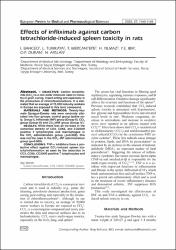Effects of infliximab against carbon tetrachloride-induced spleen toxicity in rats

View/
Access
info:eu-repo/semantics/openAccessDate
2023Author
Bahçeci, İlkayTümkaya, Levent
Mercantepe, Tolga
Yılmaz, H.
İbik, Y.E.
Duran, Ömer Faruk
Arslan, Nurgül
Metadata
Show full item recordCitation
Bahcecı, I., Tumkaya, L., Mercantepe, T., Yılmaz, H., Ibık, Y. E., Duran, O. F., & Arslan, N. (2023). Effects of infliximab against carbon tetrachloride-induced spleen toxicity in rats. European review for medical and pharmacological sciences, 27(3), 1140–1146. https://doi.org/10.26355/eurrev_202302_31220Abstract
OBJECTIVE: Carbon tetrachloride (CCl4
) is a non-polar molecule used in industry in grain curing, insect-killing and especially in
the production of chlorofluorocarbons. It is estimated that an average of 70,000 industry workers
in Europe are exposed to this toxic compound.
MATERIALS AND METHODS: Twenty-four
male Sprague-Dawley rats were randomly allocated into four groups: control group (saline only, Group I), infliximab (INF) group (Group II), CCl4
group (Group III) and CCl4+INF group (Group IV).
RESULTS: While there was an increase in the
numerical density of CD3, CD68, and CD200R
positive T lymphocytes and macrophages in
the CCl4
administration group (p=0.000), this
was not the case in the CCl4+INF administration
group (p=0.000).
CONCLUSIONS: TNF-α inhibitors have a protective effect against CCl4-induced spleen toxicity/inflammation as seen by the reduction in
CD3, CD68, CD200R positive T lymphocytes and
macrophages.

















